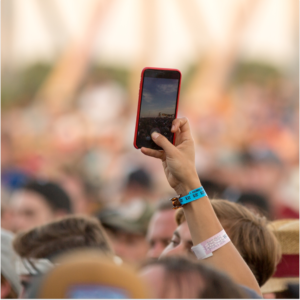16-year-old Camille Hasbani admits her parents are right about the use of social media

‘Concert crowds are now full of people filming instead of dancing and simply enjoying the occasion.’
Picture by: Ryan Johnson | Flickr
Article link copied.
April 4, 2025
Gen Z teens want a digital detox and to embrace analogue life

As a 16-year-old Gen Z, the digital world has almost always been in my life and a subject of conversation in my community. Throughout my childhood, I remember constantly disagreeing with my parents about the amount of time I spent in front of a screen. I thought I was spending a relatively short amount of time online, but my parents always said it was too much.
As a pre-teen, I thought they were just old and did not understand my world. However, as I grew up I realised that the 4–6 hours I spend on screens, especially social media, is very high and potentially concerning.
Globally, Gen Zers are raising concerns – ironically, on social media – about their screen time and usage of the platforms. Simultaneously though, they are finding and sharing solutions to the problem.
Harbingers’ Weekly Brief
In 2025, Gen Zs spend (on average) seven hours and 18 minutes per day on screens. More and more people are starting to speak up about the negative emotions they feel towards social media, and their screen time in general.
Influencers and celebrities across the globe are beginning to talk about their negative experiences, despite many of them relying on it for their livelihoods. Lena Mahfouf, a French YouTuber and influencer, said that social media “has destroyed me mentally these last few years,” and highlights that “it brings you more negativity than joy”.
Ali Kazeem, better known as AK, is a Danish YouTuber and podcaster. He has said that “you feel like you’re closing yourself in your own little bubble”, emphasising his experience of feeling more isolated as his screen time increases.
Many people relate to this sense of isolation, recounting their experiences and fears in the comment sections of these videos.
Many also talk about memories they had or wish they could have had without phones and social media, full of nostalgia. A significant part of these memories relate to children, who are often introduced to iPads, cell phones and televisions as toddlers. I remember all the time I spent outside with my friends as a child, and how fun it was to talk and play without being interrupted or distracted by our phones.
There is considerable criticism of this method of bringing up children among Gen Zers. For example, my 20-year-old friend in Amsterdam remembers his own childhood, where he would go outside and play football, saying that he “wishes more childhoods were without the internet and had more real-life play”.
Living in the moment
Another phenomenon I have noticed is the constant need to film and post every aspect of our lives.
For example, concert crowds are now full of people filming instead of dancing and simply enjoying the occasion. I showed a video of a concert to my mum, and the first thing she said was: “Why do all these people have their phones in their hands?”
The abundance of filming and posting leads to competitions on social media of who has the most interesting life to show. This instills in people a feeling called FOMO (“fear of missing out”). People are increasingly complaining about the pressure to film and post, which prevents them from “being in the moment”. The spirit of these social events has been undermined by phones and social media.
A solution to the constant need to film and post content was put forward by Coldplay singer Chris Martin, who has implemented a no-phone policy during the band’s concerts. In 2022, he askedthe audience at Wembley to put their phones in their pockets and said that “maybe we could do one song all together with no cell phones”. The band later reiterated this no-phone policy during other concerts.
The growing concern for our generation’s screen time has been seen online through different trends and videos. People have been trying to find all sorts of activities to spend less time on screens and relieve the pressure of social media.
Some, such as AK, have been talking about sports as a solution. He describes his appreciation for muay thai, a martial art, saying:“ It is nice to go out and detox. It is one hour without a phone without anything at all… It’s just you against an opponent.”
Others choose a more radical approach and decide to cut off all social media, or even all screens, for a period – a process known as “digital detoxing”. French influencer Soukaina Safaar cut all social media for 45 days. She emphasised how much it had helped her productivity, encouraged her to spend more time with her loved ones and overall feel better about herself.
Lena Mahfouf went even further, only using her computer a few hours a day to work and a cell phone to stay in contact with her loved ones. She filmed the entire experience on her YouTube channel and throughout the video expressed multiple times how it improved her life and mental health.
There is a certain irony in influencers and YouTubers advertising a lifestyle far away from screens and social media. For most of them, it is their main source of income and mode of communication. It begs the question, why did they start posting on social media, if they find it so negative?
This presents viewers with a dilemma: listen to their favourite idol and therefore stop listening to them, or ignore them and continue watching their content? Dilemmas such as these open up a larger discussion about the digital world and the benefits (or not) of its usage.
Maybe my parents are right and I should stop being on my phone and go outside.
Written by:

Contributor
Copenhagen, Denmark
Born in 2008 in France, Camille studies in Copenhagen, Denmark. She is interested in politics and history and plans to study international relationships. For Harbingers’ Magazine, she writes about close-to-life experiences.
In her free time, Camille enjoys travelling, reading and practising sports. She is also currently learning Arabic and participates in the Model United Nations.
Camille speaks French, Danish, English and partly Arabic.
Edited by:

🌍 Join the World's Youngest Newsroom—Create a Free Account
Sign up to save your favourite articles, get personalised recommendations, and stay informed about stories that Gen Z worldwide actually care about. Plus, subscribe to our newsletter for the latest stories delivered straight to your inbox. 📲
© 2025 The Oxford School for the Future of Journalism


